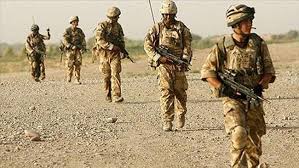Scholars Question Methodology Of New Poll On Gay Troops
Concerns Raised About Relevance of Survey Questions
SANTA BARBARA, CA, – Academic researchers are expressing concerns over a new survey about “don’t ask, don’t tell” that the Military Times has distributed to some of its subscribers. The poll is expected to play a role in upcoming debates over whether to lift the ban on openly gay service, which leaders in Congress have promised in 2010.
Researchers are particularly concerned about the potential for response bias, a phenomenon that can occur when questions are not worded or arranged neutrally. After a number of questions about the respondent’s age and rank, the Military Times survey poses questions about sexual advances by gay troops, and follows those by asking about attitudes toward “don’t ask, don’t tell.”
Professor Aaron Belkin said that by prompting respondents to link sexual predation with the gays-in-the-military-issue, the survey may generate misleading results. “If you set up a scenario about sexual predation and then ask someone how they feel about gays in the military, you can predict the response is not going to be positive.” Belkin is associate professor of political science and director of the Palm Center at the University of California, Santa Barbara
Dr. Gary Gates said that on hot-button emotional issues like gay rights, “survey researchers must pay particular attention to framing their questions in neutral ways.” Gates is a co-author of a report just released in conjunction with the Williams Institute which addresses how the “potentially stigmatizing nature of some of the questions surrounding sexual orientation” can bias responses. Gates is Williams distinguished scholar at the Williams Institute at the UCLA School of Law, and the report is titled, “Best Practices for Asking Questions about Sexual Orientation on Surveys.”
University of California scholars also said the poll, which is not representative but is administered to readers of the Military Times, asks questions that may not be relevant to the dialogue about openly gay service. Dr. Nathaniel Frank, senior research fellow at the Palm Center, said the relevant question is not what the troops want, but whether they are capable of serving with gays without becoming undisciplined. “From a poll that does ask the right questions, we’ve learned that three quarters of troops are comfortable around gay people and that two thirds already know or suspect gays in their units,” he said, referring to a 2006 Zogby poll of troops returning from Iraq and Afghanistan.
Belkin said “there was no poll asking the troops if they wanted to invade Iraq,” and that if the U.S. had based racial integration on troop attitudes, it would not have integrated the military beginning in 1948.
Gates said that bias and antipathy toward gay troops “does not justify treating them differently under the law. Instead, it should serve as impetus to change irrational prejudices and policies and create an environment where LGBT people can serve their country openly, honestly, and with dignity.”
